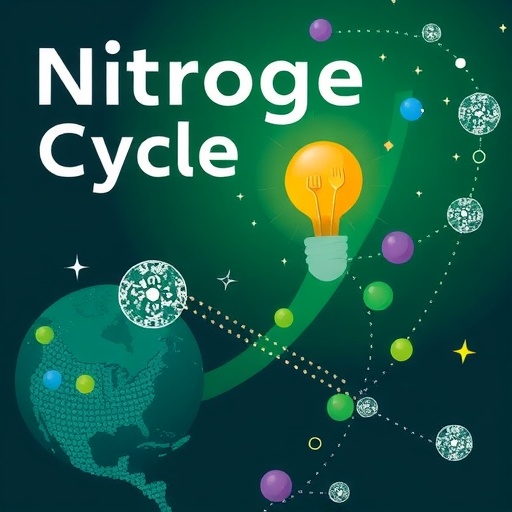We are excited to announce the official launch of Nitrogen Cycling, a groundbreaking open-access journal dedicated to pioneering research in the complex and vital domain of the nitrogen cycle. This peer-reviewed publication aims to serve as a hub for interdisciplinary scientific discourse, offering a fresh platform where fundamental insights and applied innovations converge to deepen our understanding of nitrogen’s role in ecosystems worldwide. The journal stands at the forefront of environmental science, poised to accelerate the implementation of sustainable nitrogen management strategies critical to global ecological and agricultural health.
Nitrogen, as a fundamental element driving biological productivity, shapes the structure and function of virtually every terrestrial and aquatic ecosystem. Yet, the global nitrogen cycle remains one of the least understood planetary systems due to its intricate biological, chemical, and physical pathways. Nitrogen Cycling is committed to unraveling these complexities by promoting research that spans from molecular microbiology to landscape-level biogeochemistry. In this context, the journal will emphasize studies illuminating nitrogen transformations such as mineralization, immobilization, nitrogen fixation, nitrification, and denitrification across a diverse array of settings, including agricultural lands, forests, grasslands, wetlands, oceans, and animal husbandry systems.
A key focus of the journal lies in elucidating the role of microbial communities that mediate critical nitrogen processes. Nitrogen-fixing bacteria and nitrifying and denitrifying microbes are keystone players in the nitrogen cycle, yet their diversity and functionality—and their intricate interactions with plants and environmental factors—remain elusive in many ecosystems. Cutting-edge molecular techniques, including multi-omics approaches, promise to shed light on these microbial contributors with unprecedented resolution. Through fostering studies exploiting these state-of-the-art tools, Nitrogen Cycling is set to redefine our understanding of microbial nitrogen dynamics and their implications for ecosystem resilience.
Another imperative theme featured in the journal is the far-reaching impact of nitrogen transformations on environmental health. Excessive reactive nitrogen species generated through anthropogenic activities have significant consequences for soil and water quality, atmospheric chemistry, biodiversity, and even human well-being. These disturbances contribute heavily to eutrophication of aquatic ecosystems, greenhouse gas emissions, and soil acidification, among other issues. The journal will spotlight multidisciplinary research assessing nitrogen’s cascading effects within coupled human–natural systems, thereby advancing sustainable management practices that mitigate such deleterious outcomes.
The integration of novel technologies forms a cornerstone of Nitrogen Cycling’s innovative mission. Stable isotope tracing techniques, which allow researchers to map nitrogen pathways with fine spatial and temporal resolution, are revolutionizing our capacity to track nitrogen flows in situ. Similarly, the application of artificial intelligence and machine learning is becoming indispensable in modeling the multifaceted interactions governing nitrogen cycling, enabling predictive analytics that inform policy and land management decisions. By encouraging contributions harnessing these cutting-edge methodologies, the journal seeks to spur transformative advances in nitrogen science.
Addressing the dual challenge of enhancing nitrogen use efficiency and minimizing environmental hazards is a paramount concern for global food security and ecosystem sustainability. Nitrogen Cycling will actively promote research that develops and evaluates agronomic practices, biotechnological interventions, and ecological solutions designed to optimize nitrogen fertilizer application, reduce nitrogen losses, and foster circular nitrogen economies. These innovative approaches not only promise economic benefits but also hold the key to mitigating climate change and protecting biodiversity.
The journal’s launch period is marked by a special commitment to accessibility and community engagement. From 2025 through 2027, Nitrogen Cycling offers a complete waiver of article processing charges for all accepted manuscripts, removing financial barriers and inviting a diverse array of researchers to contribute their groundbreaking work. By fostering this open-access ethos, the journal champions equitable knowledge dissemination, empowering scientists and stakeholders globally to participate actively in nitrogen sustainability dialogues.
Biogeochemical modeling remains a crucial tool in understanding nitrogen fluxes at scales ranging from microbial communities to global ecosystems. Nitrogen Cycling is dedicated to showcasing advances in mechanistic and data-driven models that simulate nitrogen cycling processes, predict environmental feedbacks, and evaluate management scenarios. Such models are indispensable in crafting robust environmental policies and land-use strategies that balance productivity with conservation.
The nitrogen cycle intersects intricately with global climate dynamics, as nitrogen compounds like nitrous oxide are potent greenhouse gases. Through its emphasis on interdisciplinary studies, the journal encourages research exploring the feedback loops between nitrogen cycling and climate change. This includes investigating how changing climate variables alter nitrogen-transforming microbial communities and, reciprocally, how nitrogen-driven emissions influence atmospheric chemistry and climate trajectories.
An essential feature of Nitrogen Cycling is the emphasis on translational research that bridges fundamental findings with practical applications. The journal aims to catalyze innovation by providing a forum where insights from molecular biology, ecosystem science, and environmental engineering intersect. The resultant synergies are expected to generate effective technological and policy solutions that advance sustainable nitrogen management on local, regional, and global scales.
Engagement with the broader scientific community and public is a priority for Nitrogen Cycling. The journal invites contributions that not only push the frontiers of scientific knowledge but also improve science communication on nitrogen-related issues. Enhancing public understanding and policy maker awareness is vital to fostering informed decisions that safeguard environmental and human health.
The editorial team, composed of leaders in microbial ecology, environmental chemistry, agronomy, and modeling, commits to maintaining rigorous peer review standards and fostering an inclusive, collaborative platform. This combination ensures that Nitrogen Cycling will become a high-impact source of quality research and a beacon for the next generation of scientists dedicated to unraveling nitrogen’s complexities.
In conclusion, the launch of Nitrogen Cycling represents a transformative moment in environmental science. By amalgamating cutting-edge research, innovative methodologies, and open-access dissemination, the journal positions itself as a vital resource in addressing one of the most pressing challenges of the 21st century: managing nitrogen in a way that sustains ecosystems, supports agriculture, mitigates climate change, and protects human health. Researchers and practitioners worldwide are encouraged to contribute to this exciting new venture and help shape the future of nitrogen science.
Subject of Research: Not applicable
Article Title: Inaugural editorial of Nitrogen Cycling
News Publication Date: 8-Aug-2025
Web References: http://dx.doi.org/10.48130/nc-0025-0001
Image Credits: Xiaoyuan Yan, Deli Chen
Keywords: Nitrogen, Sustainable development, Scientific writing




